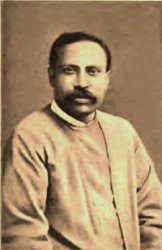Sarat Chandra Das
| Sarat Chandra Das শরৎচন্দ্র দাস |
|
|---|---|

Sarat Chandra Das
|
|
| Born | 1849 Chittagong, Bengal, British India |
| Died | 1917 |
| Nationality | British India |
| Occupation | Explorer, Scholar |
Sarat Chandra Das (Bengali: শরৎচন্দ্র দাস) (1849–1917) was an Indian scholar of Tibetan language and culture most noted for his two journeys to Tibet in 1879 and in 1881–1882.
Born in Chittagong, eastern Bengal to a Hindu family, Sarat Chandra Das attended Presidency College, as a student of the University of Calcutta. In 1874 he was appointed headmaster of the Bhutia Boarding School at Darjeeling. In 1878, a Tibetan teacher, Lama Ugyen Gyatso arranged a passport for Sarat Chandra to go the monastery at Tashilhunpo. In June 1879, Das and Ugyen-gyatso left Darjeeling for the first of two journeys to Tibet. They remained in Tibet for six months, returning to Darjeeling with a large collection of Tibetan and Sanskrit texts which would become the basis for his later scholarship. Sarat Chandra spent 1880 in Darjeeling poring over the information he had obtained. In November 1881, Sarat Chandra and Ugyen-gyatso returned to Tibet, where they explored the Yarlung Valley, returning to India in January 1883.
For a time, he worked as a spy for the British, accompanying Colman Macaulay on his 1884 expedition to Tibet to gather information on the Tibetans, Russians and Chinese. After he left Tibet, the reasons for his visit were discovered and many of the Tibetans who had befriended him suffered severe reprisals. For the latter part of his life, Das settled in Darjeeling. He named his house "Lhasa Villa" and played host to many notable guests including Sir Charles Alfred Bell and Ekai Kawaguchi. Johnson stated that, in 1882 Das met with Helena Blavatsky and Henry Steel Olcott, the two individuals notable for the founding of the Theosophy Society.
...
Wikipedia
